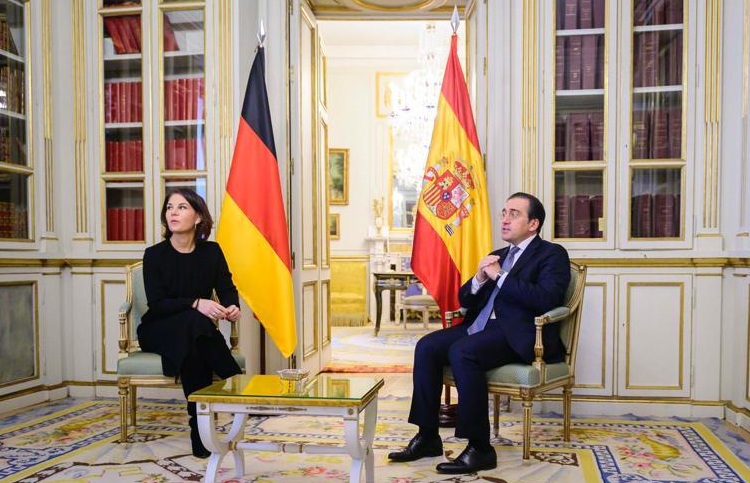The Diplomat
The Ukraine crisis and the possible withdrawal of part of the Russian troops stationed near the border inevitably starred yesterday in the meeting between Foreign Minister José Manuel Albares and his German counterpart, Annalena Baerbock, at the Palacio de Viana in Madrid.
“It is still too early” to assess the alleged withdrawal of Russian troops announced by Moscow, Albares declared at the press conference following the meeting. “We are verifying whether it is really a small de-escalation,” but, in any case, it would be “excellent news,” he continued. In this regard, NATO Secretary General Jens Stoltenberg said yesterday that there had been no perceived pullback of Russian forces near the Ukrainian borders and warned that any withdrawal should include the withdrawal of heavy equipment and artillery capable of launching “a military incursion at short notice.” Ukrainian Foreign Minister Dmytro Kuleba was cautious about this supposed withdrawal.
According to Albares, “war is avoidable, high-density diplomacy is the way and all the forums for diplomatic dialogue are open, such as the OSCE or the NATO-Russia Council”, but “the ball is in Russia’s court, which has no reason to concentrate 130,000 soldiers”. Therefore, Moscow must “participate in good faith in diplomatic dialogues and clearly de-escalate, and if this de-escalation does not take place, we will have to resort to deterrence.”
“We are prepared for any scenario,” said Albares, who reiterated that Germany, Spain and the rest of the EU members remain “united in the defense of territorial sovereignty, freedoms and rights of Ukrainian citizens.” “Spain and Germany will continue to deploy active diplomacy in defense of Europe,” because “Europe is a construction of peace, stability and prosperity,” he said.
Baerbock
For her part, Baerbock did not want to comment on the possible withdrawal of Russian troops because it is first necessary “to contrast any statement that reaches the public opinion to check whether it is true information or rumors”. In any case, she agreed with Albares that “any step in the de-escalation would be a moment of hope, although what is needed are facts”.
The German minister -who visited Ukraine on February 7 to meet with her counterpart, Dmytro Kuleba, and to observe on the ground the situation on the eastern border with Russia- also assured that NATO “is prepared for all scenarios and to act with tough measures”, but “we must do everything possible for the conflict to be solved peacefully”, because “Russia is playing with fire and this is extremely dangerous for the whole of Europe”. Therefore, she warned in the same line as Albares, “it is now up to Russia to choose the path of de-escalation through concrete steps”.
Baerbock’s visit to Spain coincided with the trip of the German Chancellor, Olaf Scholz, to Moscow to meet with the Russian President, Vladimir Putin, and to convey to him the same arguments presented yesterday by the Minister in Madrid. Scholz himself recently traveled to Kiev to meet with President Volodymyr Zelensky, to whom he reminded that Germany is the country that has helped Ukraine economically the most in the last eight years. Germany, like Spain, is reluctant to send arms to Ukraine.
During the press conference, Albares confirmed that he will participate on February 18-19 in the new edition of the Munich Security Conference, the most important annual event on this subject in the world, which this year will obviously be absolutely conditioned by the crisis in Eastern Europe. The United States has already announced the presence of Vice President Kamala Harris to demonstrate Washington’s “steadfast commitment” to NATO allies and its “support for Ukraine’s sovereignty and territorial integrity”. On the other hand, the one who will not attend the Conference, for the first time in more than twenty years, is Russia (the forum has been held in the Bavarian capital since 1963 and Moscow has been participating since 1999). According to Kremlin spokesman Dmitry Peskov, President Vladimir Putin has no intention of participating “in any format”.
Mali
The two foreign ministers also agreed on the need for the EU to decide on the future of the European Union Training Mission in Mali (EUTM Mali), after France threatened to withdraw its 5,000 troops from the country in retaliation for the expulsion of its ambassador in Bamako. “France will announce whatever it has to announce,” but “any change, reduction or disappearance must be adopted at the European level,” Albares warned. For her part, Baerbock admitted that “the political scenario has changed profoundly” and, for this reason, “the European mission must be evaluated”.
Spain currently provides the largest contingent (500 soldiers, 24% of the total) to EUTM Mali. For her part, Annalena Baerbock herself recently announced that Germany might reconsider the permanence of its more than 300 troops in EUTM Mali and of its nearly 1,000 soldiers in the UN mission (MINUSMA).







